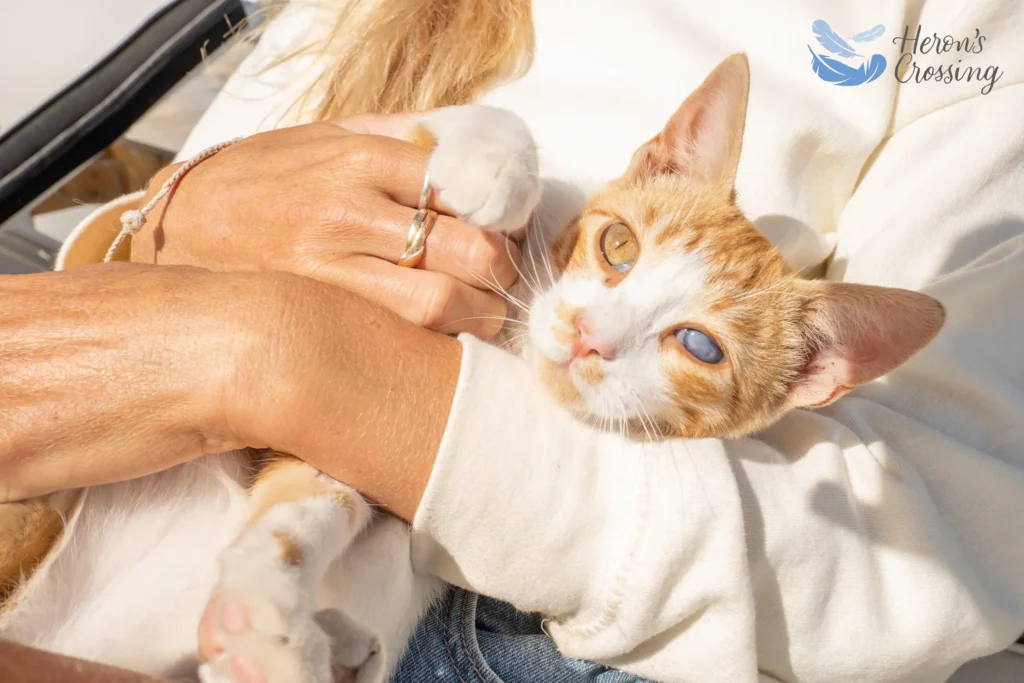Our cats are our playful companions, and they bring us so much comfort. But when they are born with physical difficulties or come to develop them, they will need to rely on us a lot more.
When it comes to losing sight or hearing, neither of you may be aware of it at first if the onset is gradual. It is often discovered during a routine vet visit. Note whenever your kitty doesn’t seem to respond normally, seems confused, or clumsy, has cloudy eyes, very large pupils, or tilts her head a lot.
If the onset of blindness is sudden, then be prepared to deal with fear, frustration or depression. Your cat may be afraid to move around. You’ll have to assure her that you’ll be there for her. Your tone of voice and reassuring touch will be important.
You’ll be using your voice more often, by telling her that you’re walking up to her, for example, so she won’t be startled. Always approach her from the front. She will feel vulnerable from the backside, and you don’t want to frighten her. Note her condition on her collar tag, and tell visitors how they can help to make her feel comfortable around them.
Safe-proof the house with baby gates, sharp-corner bumpers, and screening of some sort along stair railing to keep her from falling through. Add different-textured carpet runners to create paths for her to locate her bed or eating area. Keep things in the same place to help her develop an internal map, and be more aware of accidentally leaving things in her way, such as shoes or shopping bags.
She’ll learn to use her other senses in greater depth, navigation by room fresheners and other scents, the sounds of things, or her whiskers as she approaches an object. Cats also leave trails with the scent glands in their paws to help them retrace their steps, or mark objects with cheek glands to help map the way.
Play soothing music or quiet TV, get noisy toys if she likes to play, open windows so she can hear birds singing, and get a bubbly water drinking fountain to enrich her life with other sensations.
Be prepared for the accidental miss in the litter box. She’s trying her best.
Keep her indoors to be absolutely safe, and make sure she’s microchipped in case she slips out accidentally. If you must move to a new location, keep her in one room until she is thoroughly accustomed to it, and then let her walk down the hall (leaving her scent trail) to one room at a time to get accustomed to it.
Likewise, if your kitty becomes deaf, note this on her collar tag and tell visitors. Cats who are mostly white tend to have chromosomes that can lead to deafness more often.
Don’t startle her awake. Turn on a lamp, open the blinds or put some food nearby to gently rouse her out of sleep naturally. Smile a lot and let her know everything is going to be alright.
Facial expressions will become very important to convey messages, and over time you’ll develop so many visual ‘conversations’ that you won’t realize you’re doing it. Show her your keys, the leash, her food bowl and other items to give her clues about what comes next. You’d be amazed at how quickly she will catch on. Be prepared for her to be more vocal and give you more signs as well.
If there are other pets in the family, help them learn how to respond to your blind or deaf cat. A disability will likely change her place in the group social structure. If your cat is male, this may be even more difficult to accept. Help the readjustment by doing more things together, to make your kitty feel loved and favored.
As you help your cat to overcome her physical adversity, both of you will develop a truly special, inseparable bond.
Heron’s Crossing provides end-of-life care for pets in the Metro Atlanta area. In-home appointments with compassionate vets are available. If you’d prefer a home-like setting away from your home, our Decatur office is also available by appointment.

